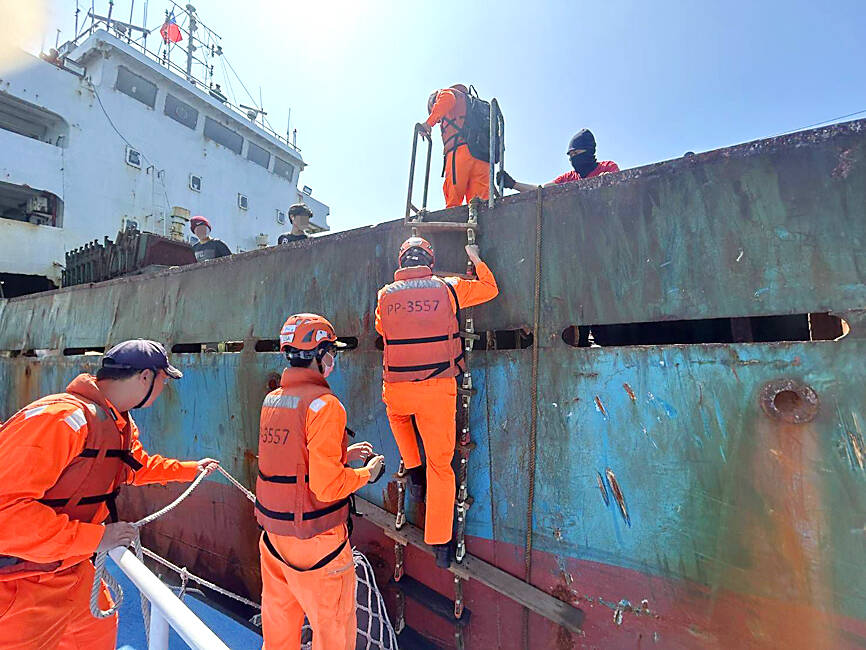China could block undersea cable repair vessels if a conflict across the Taiwan Strait were to occur, which would be a major problem for Taiwan as more than 90 percent of its Internet connectivity depends on submarine cable links, a report by intelligence advisory firm Recorded Future said.
The report, titled “Submarine Cables Face Increasing Threats Amid Geopolitical Tensions and Limited Repair Capacity,” was released by Recorded Future’s intelligence research unit Insikt Group on Thursday last week.
Insikt said its conclusion was based on an analysis of recent territorial conflicts between China and the Philippines in the South China Sea, where the China Coast Guard has tried to block Philippine resupply operations to vessels at the Second Thomas Shoal (Renai Shoal, 仁愛暗沙), Scarborough Shoal (Huangyan Island, 黃岩島) and Sabina Shoal (Xianbin, 仙濱暗沙).

Photo courtesy of the Coast Guard Administration’s Southern Branch.
In addition, the China Coast Guard and other Chinese forces have for decades interfered with vessels from other claimants in the South China Sea and vessels operated by powers outside the region, such as the US, the report said.
“These incidents suggest that Beijing could take similar action to block repair vessels from accessing damaged submarine infrastructure in the event of a potential escalation of tension or outbreak of hostilities around Taiwan,” it said.
The report echoed growing concerns over recent Chinese ploys to damage undersea cables around Taiwan, including an incident involving the Taiwan-Matsu No. 3 fiber-optic cable that broke on Jan. 15.
The repairs were completed by Chunghwa Telecom Co in early March.
The Ministry of Digital Affairs attributed the damage to that cable, and another one linking Taiwan and Matsu, to “natural deterioration.”
However, such incidents have sparked speculation that China is engaged in “gray zone” activities — provocative moves that fall short of outright war — targeting Taiwan’s telecommunications connections.
From last year to this year, four incidents have taken place in the Baltic Sea involving damage to eight distinct submarine cables, while five incidents occurred around Taiwan involving damage to five distinct submarine cables, the report said.
Five of the nine incidents were attributed to ships dragging their anchors, including four China or Russia-linked vessels operating under suspicious circumstances or with opaque ownership structures.
“Geopolitical tensions — namely, Russia’s war against Ukraine and China’s coercive actions toward Taiwan — very likely remain the primary drivers of state-linked sabotage activity targeting submarine cables,” the report said.
The expanding role played by Chinese companies in deploying, owning and operating submarine cables has raised the threats of espionage for the countries and companies that use them, Insikt said.
“Specifically, China’s preparations for a potential military incursion into Taiwan and the deterioration of US-China bilateral relations very likely incentivize physical attacks and intelligence collection efforts targeting the submarine cable system to undermine the economic, diplomatic and security objectives,” they said.
To mitigate the possible challenges posed by China, Insikt said that it was critical to conduct comprehensive stress tests to improve resilience and guard against damage that would cause prolonged connectivity issues.
Based on three prolonged outages around the world due to cable damage, the report said that the lack of redundancy and diversity of cable routes, as well as limited repair capacity, would likely raise the risk of severe impact of damage to submarine cables.

Alain Robert, known as the "French Spider-Man," praised Alex Honnold as exceptionally well-prepared after the US climber completed a free solo ascent of Taipei 101 yesterday. Robert said Honnold's ascent of the 508m-tall skyscraper in just more than one-and-a-half hours without using safety ropes or equipment was a remarkable achievement. "This is my life," he said in an interview conducted in French, adding that he liked the feeling of being "on the edge of danger." The 63-year-old Frenchman climbed Taipei 101 using ropes in December 2004, taking about four hours to reach the top. On a one-to-10 scale of difficulty, Robert said Taipei 101

Nipah virus infection is to be officially listed as a category 5 notifiable infectious disease in Taiwan in March, while clinical treatment guidelines are being formulated, the Centers for Disease Control (CDC) said yesterday. With Nipah infections being reported in other countries and considering its relatively high fatality rate, the centers on Jan. 16 announced that it would be listed as a notifiable infectious disease to bolster the nation’s systematic early warning system and increase public awareness, the CDC said. Bangladesh reported four fatal cases last year in separate districts, with three linked to raw date palm sap consumption, CDC Epidemic Intelligence

Taiwanese and US defense groups are collaborating to introduce deployable, semi-autonomous manufacturing systems for drones and components in a boost to the nation’s supply chain resilience. Taiwan’s G-Tech Optroelectronics Corp subsidiary GTOC and the US’ Aerkomm Inc on Friday announced an agreement with fellow US-based Firestorm Lab to adopt the latter’s xCell, a technology featuring 3D printers fitted in 6.1m container units. The systems enable aerial platforms and parts to be produced in high volumes from dispersed nodes capable of rapid redeployment, to minimize the risk of enemy strikes and to meet field requirements, they said. Firestorm chief technology officer Ian Muceus said

MORE FALL: An investigation into one of Xi’s key cronies, part of a broader ‘anti-corruption’ drive, indicates that he might have a deep distrust in the military, an expert said China’s latest military purge underscores systemic risks in its shift from collective leadership to sole rule under Chinese President Xi Jinping (習近平), and could disrupt its chain of command and military capabilities, a national security official said yesterday. If decisionmaking within the Chinese Communist Party has become “irrational” under one-man rule, the Taiwan Strait and the regional situation must be approached with extreme caution, given unforeseen risks, they added. The anonymous official made the remarks as China’s Central Military Commission Vice Chairman Zhang Youxia (張又俠) and Joint Staff Department Chief of Staff Liu Zhenli (劉振立) were reportedly being investigated for suspected “serious